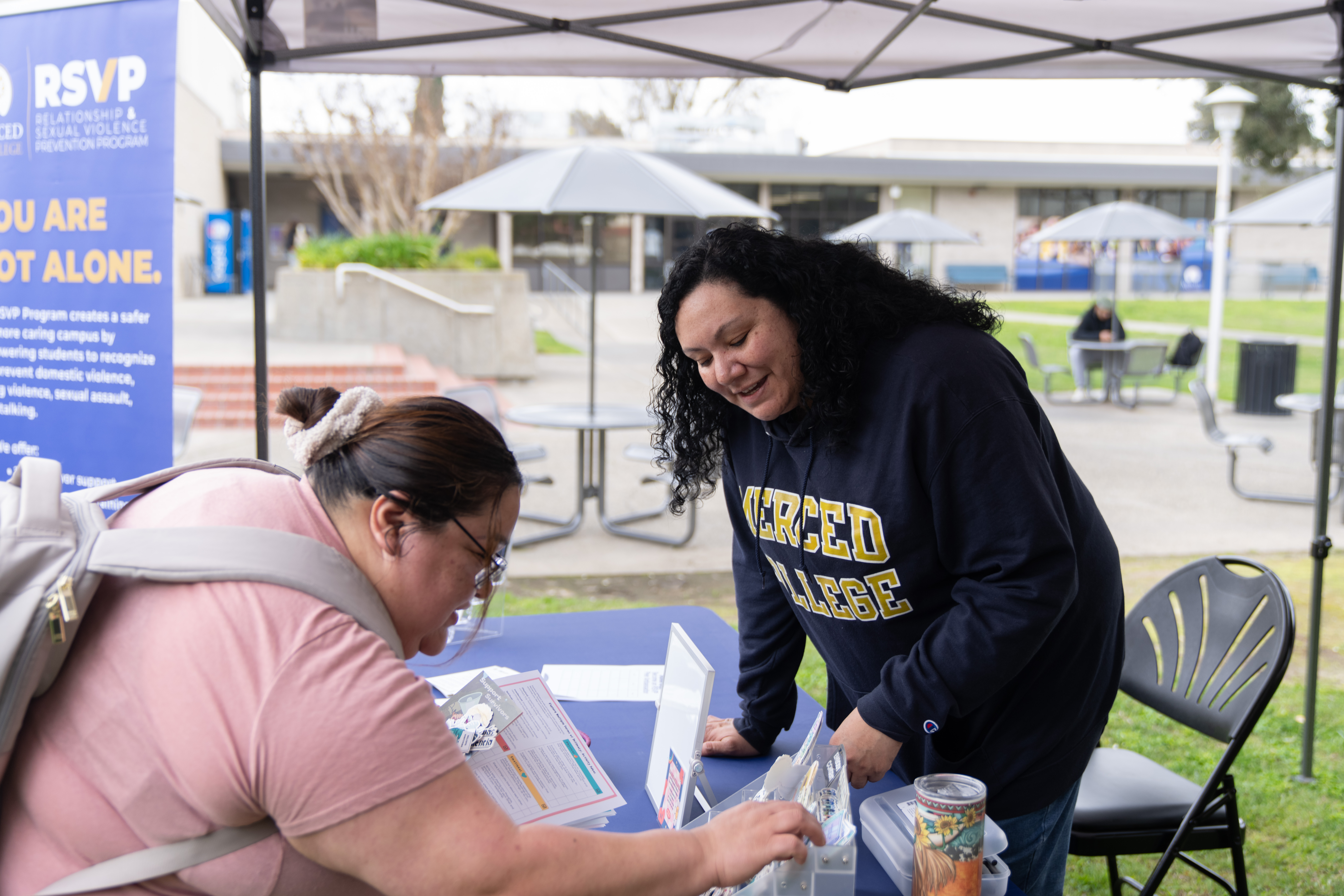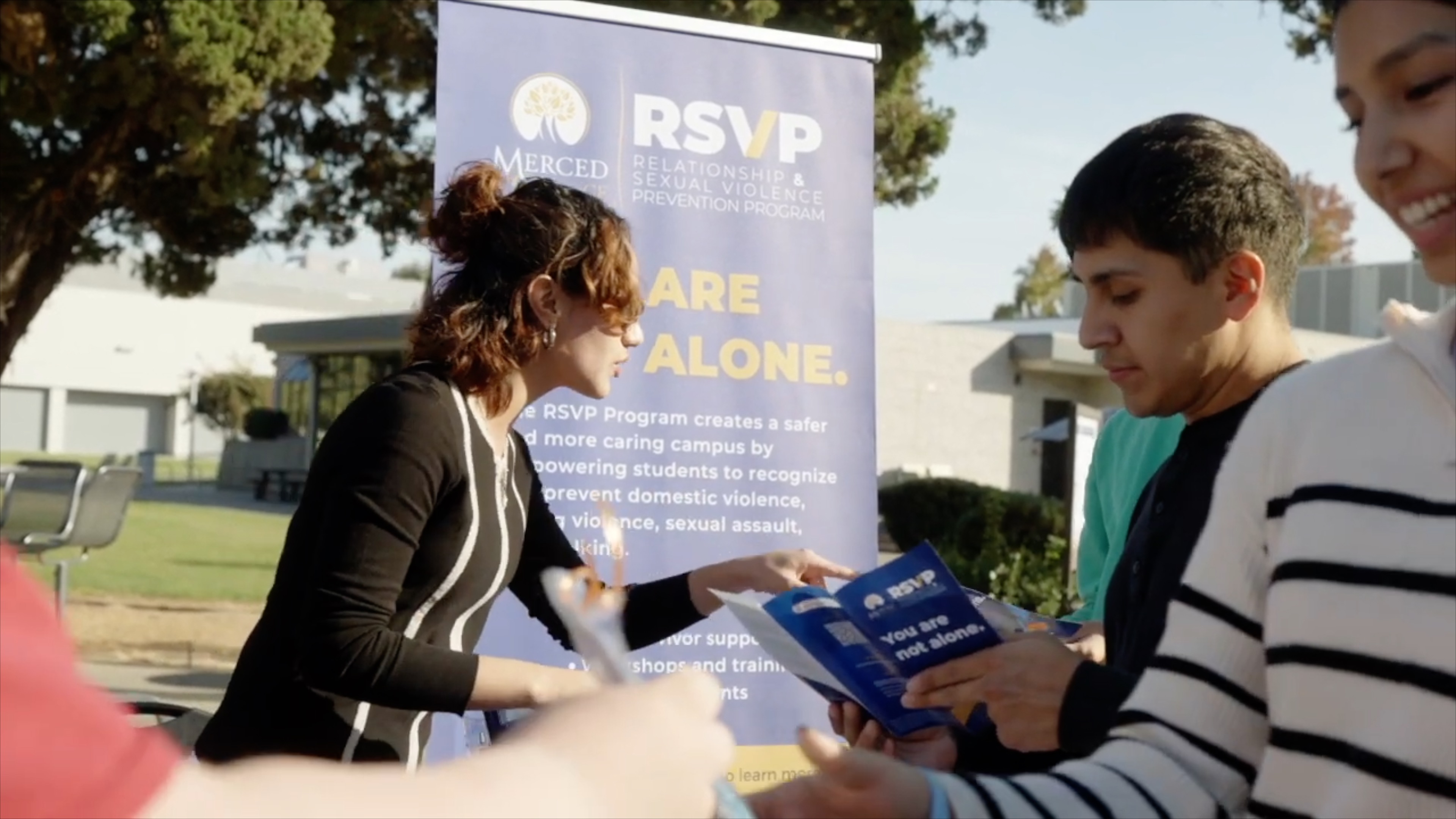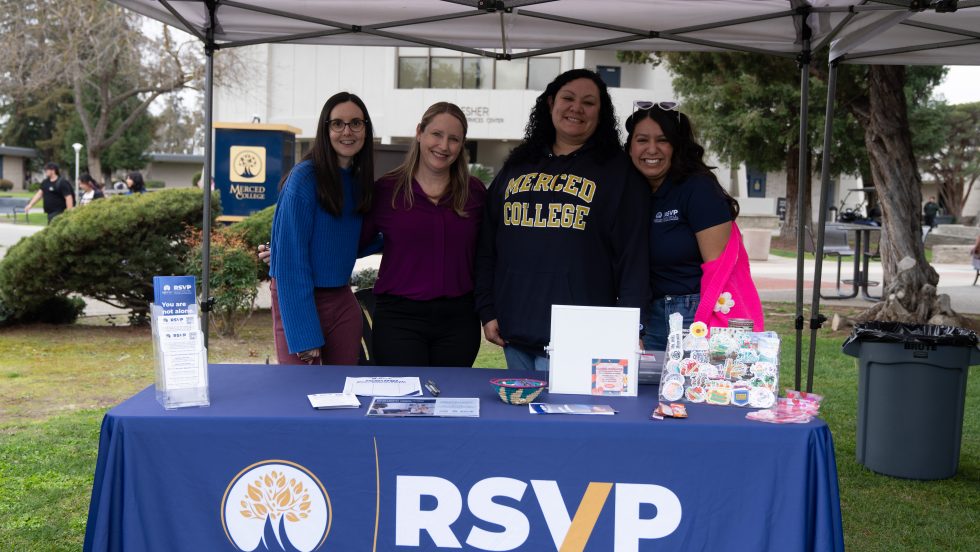Throughout April, which is Sexual Assault Awareness Month in the U.S., we’re reminded that survivors of sexual assault, domestic violence and the like, come from all genders, socioeconomic strata, races and ages.
The Relationship and Sexual Violence Prevention (RSVP) Program at Merced College was launched in 2021 to educate and empower the campus community on this serious public health issue.
“RSVP is bringing people together and sharing the human experience,” RSVP Manager Carissa Hansford said. “We’re sharing positive messages about what healthy relationships are and how to develop them. RSVP is a force for prevention.”
According to RAINN (Rape, Abuse & Incest National Network), 13% of all college students experience rape or sexual assault.
Mary Sue Savage, a national expert on campus sexual violence prevention, said increasing awareness is critical.
“Many of us do not grow up learning about consent, boundaries, or how to build healthy relationships,” said Savage, the Executive Director of the Recognize Violence Change Culture organization in Oakland. “By the time people come to college, there’s a lot of awareness and skill-building that needs to happen. A comprehensive approach is necessary. Prevention needs to be embedded within the campus culture.”
How we got here
Title IX, a comprehensive federal civil rights law enacted in 1972, gave this issue a firm base when it prohibited discrimination on the basis of sex, including all forms of sexual violence, for all institutions receiving federal funding. The Clery Act of 1990 added the Campus Sexual Assault Victim’s Bill of Rights, requiring colleges to track and disclose specific campus crime statistics and safety policies.
The State of California committed more strongly to sexual violence prevention on college campuses by passing AB 2683 in September 2022. It requires all incoming college students to complete domestic violence and sexual assault prevention training.
In October 2021, Merced College was already one of 52 campuses nationwide to receive a $300,000 grant from the U.S. Department of Justice Office of Violence Against Women (OVW) Grant to reduce domestic violence, dating violence, sexual assault, and stalking. It funds the prevention program, strengthens victim services, and provides trauma-informed training for staff.
The OVW grant requires colleges to do three things.
Merced College first had to gather its internal support groups to partner with organizations outside of campus.
The college now has a Coordinated Community Response Team (CCRT), which oversees the RSVP Program. It includes representatives from campus administration, student equity, student services, campus police, and Merced City Police.
Merced College already had a relationship with Valley Crisis Center in Merced, a local organization serving anyone in the county impacted by sexual violence and similar crimes.
The CCRT hired Valley Crisis Center veteran Daisy Castillo to act as the RSVP campus advocate. Castillo is the point person, offering confidential help and advocacy, for students, staff or faculty who have experienced sexual violence. The college also offers confidential counseling to all students from Merced College Student Health Services in both Merced and Los Banos.

The second provision required the college to create a mandatory prevention education program (RSVP) for all incoming students.
The grant also requires the school to offer active bystander intervention training. Among the first groups to train with RSVP last fall was the Office of Admissions & Records. “In Admissions and Records, we follow students throughout their whole journey on campus,” Director Jeanette Martin said. “There’s no private space in our office, but I want us to have all of the survivor-centered tools we can get in case a student comes to us in distress.” Bystander training empowers everyone to identify warning signs of sexual violence. “You don’t always have to confront someone or insert yourself,” Martin said. “We just don’t want anyone to suffer in silence. The training helps you understand the many ways you can help.” RSVP also brought Savage’s program onto campus last month, offering workshops and activities on understanding consent, building healthy relationships, and how to take a “survivor-centered” approach when working with victims. Savage said she was impressed with how warmly the Merced College community embraced the events, and the empathy and depth everyone showed during discussions throughout.
The third requirement of the grant is for campus law enforcement to train on delivering trauma-informed services that are anchored in safety, choice, collaboration, trustworthiness and empowerment.
Among the principles taught to police are to believe survivors when they say they’re being violated or abused, and even while investigating those crimes, to respect their choice about pressing charges. The RSVP Program office is located on the second floor of the Downey Learning Resource Center (LRC).
Upcoming events
RSVP will recognize Sexual Assault Awareness Month as part of Campus Pride Week, beginning April 15 with a safety planning and self-care gathering at The Hub from 11 a.m. to 1 p.m. The college will celebrate Denim Day, a national day when allies wear denim in support of survivors, on April 24. RSVP staffers and the campus advocate will share how people can participate in Denim Day on April 17 at The Hub, and on April 23 at the Los Banos Campus. On Denim Day, RSVP and Valley Crisis Center partners will be at Coffee Bandits on Main Street in Merced from 9 a.m. to 2 p.m. to talk to people about being advocates. Also, keep an eye on the program’s Instagram account (@mc_rsvp_program) for inspiration and information. “The grant wants us to be proactive, to stop bad things before they happen,” Hansford said. “Our students are starting to recognize what RSVP does. It’s happening, and that’s really cool.” Anyone on campus who has experienced sexual assault, abuse or trauma in their lives should consider contacting the Merced College RSVP Program for help at 209-756-6446 or [email protected].

